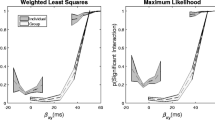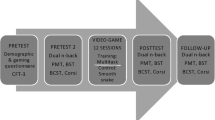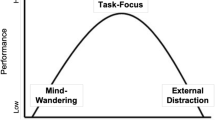Abstract
Human multitasking is typically defined as the practice of performing more than one task at the same time (dual task) or rapidly alternating between multiple tasks (task switching). The majority of research in multitasking has been focusing on individual paradigms, with surprisingly little effort in understanding their relationships. We adopted an individual-difference approach to reveal the limitations underlying multitasking costs measured in different paradigms. Exploratory factor analyses revealed not a general multitasking factor but instead three different processing limitations associated with response selection, retrieval and maintenance of task information, and task-set reconfiguration. The three factors were only weakly correlated with and thus not reducible to common measures of processing speed, working memory capacity and fluid intelligence. Males and females excelled in different aspects of multitasking, demonstrating the benefit of using a multifaceted view of multitasking competency in group comparison. Findings of the current study help resolve conflicting results between studies using different paradigms, and form the basis of more comprehensive measurement tools and training protocols covering different aspects of multitasking limitations. The study will also help future integration of multitasking abilities into the theoretical framework of executive function.


Similar content being viewed by others
Notes
Eight multitasking paradigms with 14 multitasking cost indicators were initially identified. We decided to exclude two paradigms after a pilot testing with 20 participants. The continuous tracking—word generation paradigm (Strayer & Johnston, 2001)—was discarded due to its lower reliability and the high correlation between tracking errors of the tracking tasks in this paradigm and that in the continuous tracking—working memory span paradigms. An interruption paradigm (Bai, Jones, Moss, & Doane, 2014) was also included in the pilot study and excluded in the actual experiment due to the low reliability of the interruption and resumption costs.
A difference between the text entry task adopted in Borst et al. (2010) and that in the current study was that Borst et al. (2010) required participants to enter the letters by clicking on an on-screen keypad while participants entered the letters by simply using the keyboard in the current study. Due to this difference, participants in the current study were able to move their fingers to the next letter on the keyboard during the subtraction task in the hard condition. As a result, they could respond very quickly to the text entry task in the next trial.
Velicer’s minimum average partial test (MAP) was not performed in the current study, as the MAP method showed consistent underestimation of the number of factors when the number of variables per component was small (Zwick & Velicer, 1986).
References
Achtman, R. L., Green, C. S., & Bavelier, D. (2008). Video games as a tool to train visual skills. Restorative Neurology and Neuroscience, 26, 435–446.
Alm, H., & Nilsson, L. (1995). The effects of a mobile telephone task on driver behaviour in a car following situation. Accident Analysis and Prevention, 27, 707–715.
Bai, H., Jones, W. E., Moss, J., & Doane, S. M. (2014). Relating individual differences in cognitive ability and strategy consistency to interruption recovery during multitasking. Learning and Individual Differences, 35, 22–33. https://doi.org/10.1016/j.lindif.2014.07.002.
Band, G. P. H., & van Nes, F. T. (2006). Reconfiguration and the bottleneck: Does task switching affect the refractory-period effect? European Journal of Cognitive Psychology, 18, 593–623.
Bherer, L., Kramer, A. F., Peterson, M. S., Colcombe, S., Erickson, K., & Becic, E. (2008). Transfer effects in task-set cost and dual-task cost after dual-task training in older and younger adults: Further evidence for cognitive plasticity in attentional control in late adulthood. Experimental Aging Research, 34, 188–219. https://doi.org/10.1080/03610730802070068.
Boot, W. R., Kramer, A. F., Simons, D. J., Fabiani, M., & Gratton, G. (2008). The effects of video game playing on attention, memory, and executive control. Acta Psychologica, 129, 387–398.
Bors, D. A., & Stokes, T. L. (1998). Raven’s advanced progressive matrices: Norms for first-year university students and the development of a short form. Educational and Psychological Measurement, 58(3), 382–398.
Borst, J. P., Taatgen, N. A., & van Rijn, H. (2010). The problem state: a cognitive bottleneck in multitasking. Journal of Experimental Psychology. Learning, Memory, and Cognition, 36(2), 363–382.
Colom, R., Martinez-Molina, A., Shih, P. C., & Santacreu, J. (2010). Intelligence, working memory, and multitasking performance. Intelligence, 38, 543–551.
Dux, P. E., Tombu, M. N., Harrison, S., Rogers, B. P., Tong, F., & Marois, R. (2009). Training improves multitasking performance by increasing the speed of information processing in human prefrontal cortex. Neuron, 63, 127–138. https://doi.org/10.1016/j.neuron.2009.06.005.
Elsmore, T. F. (1994). SYNWORK1: A PC-based tool for assessment of performance in a simulated work environment. Behavior Research Methods, Instruments, & Computers, 26, 412–426. https://doi.org/10.3758/BF03204659.
Engle, R. W. (2002). Working memory capacity as executive attention. Current Directions in Psychological Science, 11, 19–23.
Engle, R. W., Tuholski, S. W., Laughlin, J. E., & Conway, A. R. A. (1999). Working memory, short-term memory, and general fluid intelligence: A latent-variable approach. Journal of Experimental Psychology: General, 128(3), 309–331.
Fabrigar, L. R., Wegener, D. T., MacCallum, R. C., & Strahan, E. J. (1999). Evaluating the use of exploratory factor analysis in psychological research. Psychological Methods, 4(3), 272–299.
Foehr, U. G., Rideout, V. J., & Roberts, D. F. (2005). Generation M: media in the lives of 8–18-year-olds. Menlo Park: Henry J. Kaiser Family Foundation.
Fothergill, S., Loft, S., & Neal, A. (2009). ATC-labAdcanced: An air traffic control simulator with realism and control. Behavior Research Methods, 41, 118–127. https://doi.org/10.3758/BRM.41.1.118.
Friedman, N. P., Miyake, A., Corley, R. P., Young, S. E., DeFries, J. C., & Hewitt, J. K. (2006). Not all executive functions are related to intelligence. Psychological Science, 17(2), 172–179.
Glover, S., & Dixon, P. (2004). Likelihood ratios: A simple and flexible statistic for empirical psychologists. Psychonomic Bulletin & Review, 11(5), 791–806. https://doi.org/10.3758/BF03196706.
Hambrick, D. Z., Oswald, F. L., Darowski, E. S., Rench, T. A., & Brou, R. (2010). Predictors of multitasking performance in a synthetic work paradigm. Applied Cognitive Psychology, 24, 1149–1167.
Hembrooke, H., & Gay, G. (2003). The laptop and the lecture: The effects of multitasking in learning environments. Journal of Computing in Higher Education, 15(1), 46–64.
Huang, L., Mo, L., & Li, Y. (2012). Measuring the interrelations among multiple paradigms of visual attention: An individual differences approach. Journal of Experimental Psychology. Human Perceptual Performance, 38(2), 414–428.
Jersild, A. T. (1927). Mental set and shift. Archives of Psychology, 14, 89.
Jost, K., Mayr, U., & Rosler, F. (2008). Is task switching nothing but cue priming? Evidence from ERPs. Cognitive, Affective, & Behavioral Neuroscience, 8(1), 74–84. https://doi.org/10.3758/CABN.8.1.74.
Konig, C. J., Buhner, M., & Murling, G. (2005). Working memory, fluid intelligence, and attention are predictors of multitasking performance, but polychronicity and extraversion are not. Human Performance, 18(3), 243–266.
Kramer, A. F., Larish, J. F., & Strayer, D. L. (1995). Training for attentional control in dual task settings: A comparison of young and old adults. Journal of Experimental Psychology: Applied, 1(1), 50–76.
Lague-Beauvais, M., Gagnon, C., Castonguay, N., & Bherer, L. (2013). Individual differences effects on the psychological refractory period. SpringerPlus, 2(1), 368–377. https://doi.org/10.1186/2193-1801-2-368.
Levy, J., Pashler, H., & Boer, E. (2006). Central interference in driving: Is there any stopping the psychological refractory period? Psychological Science, 17, 228–235.
Lin, L. (2009). Breadth-biased versus focused cognitive control in media multitasking behaviors. Proceedings of the National Academy of Sciences, 106(37), 15521–15522.
Logan, G. D., & Bundesen, C. (2003). Clever homunculus: Is there an endogenous act of control in the explicit task-cuing procedure? Journal of Experimental Psychology: Human Perception and Performance, 29, 575–599.
Logan, G. D., & Gordon, R. D. (2001). Executive control of visual attention in dual-task situations. Psychological Review, 108, 393–434.
Logan, G. D., & Schneider, D. W. (2010). Distinguishing reconfiguration and compound-cue retrieval in task switching. Psychologica Belgica, 50, 413–433. https://doi.org/10.5334/pb-50-3-4-413.
Lui, K. F. H., & Wong, A. C.-N. (2012). Does media multitasking always hurt? A positive correlation between multitasking and multisensory integration ability. Psychonomic Bulletin & Review, 19(4), 647–653. https://doi.org/10.3758/s13423-012-0245-7.
Lussier, M., Gagnon, C., & Bherer, L. (2012). An investigation of response and stimulus modality transfer effects after dual-task training in younger and older. Frontiers in Human Neuroscience, 6, 1–11.
Mayr, U. (2003). Towards principles of executive control: How mental sets are selected. In R. H. Kluwe, G. Lüer, & F. Rösler (Eds.), Principles of learning and memory (pp. 223–240). Berlin: Birkhäuser.
Mayr, U., & Kliegl, R. (2003). Differential effects of cue changes and task changes on task-set selection costs. Journal of Experimental Psychology. Learning, Memory, and Cognition, 29(3), 362–372.
Meyer, D. E., & Kieras, D. E. (1997). A computational theory of executive cognitive processes and multiple-task performance: Part 1. Basic mechanisms. Psychological Review, 104, 3–65.
Miller, J., & Ulrich, R. (2013). Mental chronometry and individual differences: Modeling reliabilities and correlations of reaction time means and effect sizes. Psychonomic Bulletin & Review, 20, 819–858. https://doi.org/10.3758/s13423-013-0404-5.
Miyake, A., Friedman, N. P., Emerson, M. J., Witzki, A. H., Howerter, A., & Wager, T. D. (2000). The unity and diversity of executive functions and their contributions to complex “frontal lobe” tasks: A latent variable analysis. Cognitive Psychology, 41, 49–100. https://doi.org/10.1006/cogp.1999.0734.
Monsell, S. (2003). Task switching. Trends in Cognitive Sciences, 7(3), 134–140. https://doi.org/10.1016/S1364-6613(03)00028-7.
Ophir, E., Nass, C., & Wagner, A. D. (2009). Cognitive control in media multitaskers. Proceedings of the National Academy of Science, 106(37), 15583–15587.
Pashler, H. (1994). Dual-task interference in simple tasks: Data and theory. Psychological Bulletin, 116, 220–244.
Pashler, H. (2000). Task switching and multi-task performance. In S. Monsell & J. Driver (Eds.), Attention and performance XVIII: Control of cognitive processes (pp. 277–309). Cambridge: MIT Press.
Pashler, H., & Johnston, J. C. (1989). Chronometric evidence for central postponement in temporally overlapping tasks. Quarterly Journal of Experimental Psychology, 41A, 19–45.
Raven, J. C., Court, J. H., & Raven, J. (1985). A manual for Raven’s progressive matrices and vocabulary scales. London: H. K. Lewis.
Redelmeier, D. A., & Tibshirani, R. J. (1997). Association between cellular-telephone calls and motor vehicle collisions. The New England Journal of Medicine, 336, 453–458.
Redick, T. S., Shipstead, Z., Harrison, T. L., Hicks, K. L., Fried, D. E., Hambrick, D. Z., et al. (2013). No evidence of intelligence improvement after working memory training: A randomized, placebo-controlled study. Journal of Experimental Psychology: General, 142, 359–379. https://doi.org/10.1037/a0029082.
Redick, T. S., Shipstead, Z., Meier, M. E., Montroy, J. J., Hicks, K. L., Unsworth, N., … Engle, R. W. (2016). Cognitive predictors of a common multitasking ability: contributions from working memory, attention control, and fluid intelligence. Journal of Experimental Psychology: General, 145(11), 1473–1492. https://doi.org/10.1037/xge0000219.
Reissland, J., & Manzey, D. (2016). Serial or overlapping processing in multitasking as individual preference: Effects of stimulus preview on task switching and concurrent dual-task performance. Acta Psychologica, 168, 27–40. https://doi.org/10.1016/j.actpsy.2016.04.010.
Rogers, R. D., & Monsell, S. (1995). Costs of a predictable switch between simple cognitive tasks. Journal of Experimental Psychology: General, 124, 207–231.
Rubin, O., & Meiran, N. (2005). On the origins of the task mixing cost in the cuing task-switching paradigm. Journal of Experimental Psychology. Learning, Memory, and Cognition, 31, 1477–1491.
Ruthruff, E., Van Selst, M., Johnston, J. C., & Remington, R. W. (2006). How does practice reduce dual-task interference: Integration, automatization, or just stage-shortening? Psychological Research, 70, 125–142.
Salvucci, D. D., & Taatgen, N. A. (2008). Threaded cognition: An integrated theory of concurrent multitasking. Psychological Review, 115(1), 101–130.
Sana, F., Weston, T., & Cepeda, N. J. (2013). Laptop multitasking hinders classroom learning for both users and nearby peers. Computers & Education, 62, 24–31. https://doi.org/10.1016/j.compedu.2012.10.003.
Schmitz, F., & Voss, A. (2014). Components of task switching: A closer look at task switching and cue switching. Acta Psychologica, 151, 184–196. https://doi.org/10.1016/j.actpsy.2014.06.009.
Schumacher, E. H., Lauber, E. J., Glass, J. M., Zurbriggen, E. L., Gmeindl, L., Kieras, D. E., & Meyer, D. E. (1999). Concurrent response-selection processes in dual-task performance: Evidence for adaptive executive control of task-scheduling. Journal of Experimental Psychology: Human Perception and Performance, 25, 791–814.
Schumacher, E. H., Seymour, T., Glass, J., Fencsik, D., Lauber, E., Kieras, D., & Meyer, D. (2001). Virtually perfect time sharing in dual-task performance: Uncorking the central cognitive bottleneck. Psychological Science, 12, 101–108.
Shinar, D., Tractinsky, N., & Compton, R. (2005). Effects of practice, age, and task demands, on interference from a phone task while driving. Accident Analysis and Prevention, 37, 315–326.
Skogsberg, K., Grabowecky, M., Wilt, J., Revelle, W., Iordanescu, L., & Suzuki, S. (2015). A relational structure of voluntary visual-attention abilities. Journal of Experimental Psychology: Human Perception and Performance, 41(3), 761. https://doi.org/10.1037/a0039000.
Stoet, G., O’Connor, D. B., Conner, M., & Laws, K. R. (2013). Are women better than men at multi-tasking? BMC Psychology. https://doi.org/10.1186/2050-7283-1-18.
Strayer, D. L., & Johnston, W. A. (2001). Driven to distraction: Dual-task studies of simulated driving and conversing on a cellular telephone. Psychological Science, 12, 462–466.
Strobach, T., Frensch, P. A., Soutschek, A., & Schubert, T. (2011). Investigation on the improvement and transfer of dual-task coordination skills. Psychological Research, 76, 794–811. https://doi.org/10.1007/s00426-011-0381-0.
Tombu, M., & Jolicoeur, P. (2004). Virtually no evidence for virtually perfect time-sharing. Journal of Experimental Psychology: Human Perception and Performance, 30(5), 795–810. https://doi.org/10.1037/0096-1523.30.5.795.
Trafton, J. G., Altmann, E. M., Brock, D. P., & Mintz, F. E. (2003). Preparing to resume an interrupted task: Effects of prospective goal encoding and retrospective rehearsal. International Journal of Human-Computer Studies, 58, 583–603. https://doi.org/10.1016/S1071-5819(03)00023-5.
Van Selst, M., Ruthruff, E., & Johnston, J. C. (1999). Can practice eliminate the Psychological refractory period effect? Journal of Experimental Psychology: Human Perception and Performance, 25, 1268–1283.
Velicer, W. F., & Jackson, D. N. (1990). Component analysis versus common factor analysis: some issues in selecting an appropriate procedure. Multivariate Behavioral Research, 25(1), 1–28.
Wickens, C. D. (2008). Multiple resources and mental workload. Human Factors, 50(3), 449–455.
Wilhelm, O., Herzmann, G., Kunina, O., Danthiir, V., Schacht, A., & Sommer, W. (2010). Individual differences in perceiving and recognizing faces—One element of social cognition. Journal of Personality and Social Psychology, 99, 530–548.
Zwick, W. R., & Velicer, W. F. (1986). Comparison of five rules for determining the number of components to retain. Psychological Bulletin, 99, 432–442.
Author information
Authors and Affiliations
Corresponding author
Additional information
Publisher's Note
Springer Nature remains neutral with regard to jurisdictional claims in published maps and institutional affiliations.
This research was supported by the General Research Fund (14645416) from the Research Grants Council of Hong Kong to A.W.
Electronic supplementary material
Below is the link to the electronic supplementary material.
Rights and permissions
About this article
Cite this article
Lui, K.F.H., Wong, A.CN. Multiple processing limitations underlie multitasking costs. Psychological Research 84, 1946–1964 (2020). https://doi.org/10.1007/s00426-019-01196-0
Received:
Accepted:
Published:
Issue Date:
DOI: https://doi.org/10.1007/s00426-019-01196-0




